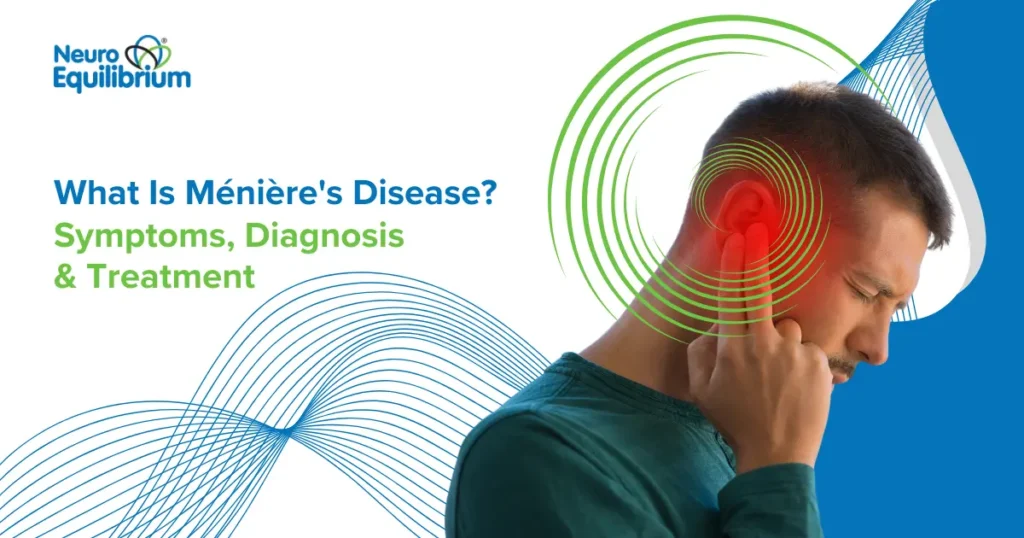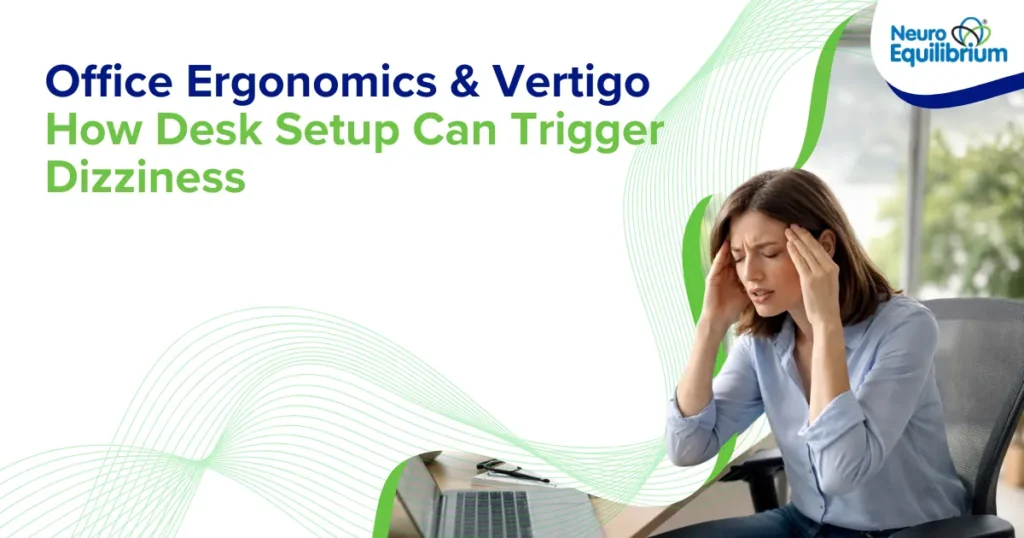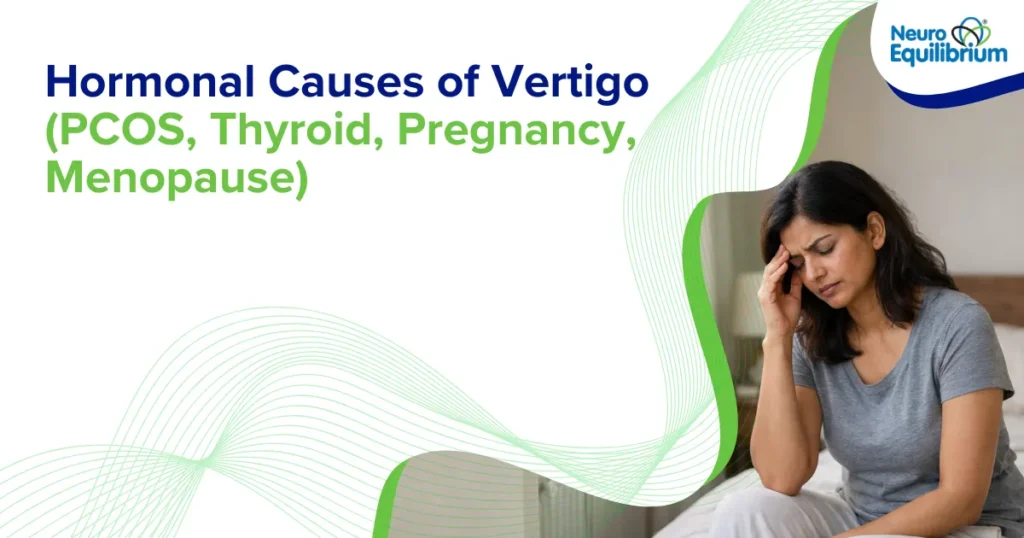Ménière’s Disease is a problem in the ear that makes people feel dizzy and unsteady. It can also make it hard to hear, with a ringing sound in the ear, and make the ear feel full.
Imagine if you sensed everything spinning around, even when you’re standing still; this is called vertigo, and it can make people feel sick and unsteady. These sensations come and go, often making it hard to carry out everyday activities.
People with Ménière’s Disease typically experience these effects in just one ear which can later on involve both ears , and they need specialized care to help manage the condition and protect their hearing.
Ménière’s Disease is caused by an abnormal buildup of fluid in the inner ear, known as endolymphatic hydrops. The inner ear contains fluid that helps control balance and hearing. When there is too much fluid or an imbalance in fluid pressure, it disrupts the normal functioning of the inner ear, leading to the characteristic symptoms of dizziness and hearing loss.
Learn More About Meniere’s Disease
- Meniere’s Disease: Understanding the Symptoms and Diagnosis
- Meniere’s Disease – Symptoms, Causes, & Treatment
Causes of Ménière’s Disease
Ménière’s Disease can be caused by various reasons that affect the ear and balance system. Here are some possible causes:
- Allergic Reactions or Autoimmune Conditions: Sometimes, the immune system, which usually fights off germs to keep us healthy, can get confused and accidentally start attacking the body’s own tissues, including the inner ear. This can lead to symptoms of Ménière’s Disease.
- Viral Infections: Certain viruses that cause infections, like colds or the flu, may impact the inner ear and cause swelling or fluid buildup, which can lead to Ménière’s Disease.
- Genetic Factors: If other family members have Ménière’s Disease, there’s a chance it might run in the family. Certain genes might make someone more likely to develop the condition.
- Migraine headaches: Migraines may be related to Ménière’s disease and cause a condition called Meniere’s-Migraine spectrum.
Common Symptoms of Ménière’s Disease
Ménière’s Disease comes with various symptoms that mainly affect the inner ear, disrupting hearing and balance. These symptoms can show up suddenly and often without warning. They can vary in how strong and frequent they are from one person to another. Here are the most common symptoms experienced by people with Ménière’s Disease:
1. Vertigo (Spinning Sensations)/loss of balance
One of the main symptoms of Ménière’s Disease is vertigo, which causes strong spinning sensations. It can feel like the room is whirling around you. These vertigo episodes can last from 20 minutes to several hours, leading to extreme discomfort and nausea. The attacks often happen suddenly and can be so intense that they cause vomiting or make it hard to walk or stand. After an episode, many people feel tired or confused for several hours or even days. This symptom can disrupt daily life a lot, making it hard to go about normal activities.
2. Hearing Loss/muffled hearing
Another important symptom of Ménière’s Disease is fluctuating hearing loss. Usually, this hearing loss affects only one ear, but it may get worse over time and could lead to permanent hearing loss. In the beginning, individuals might notice they have trouble hearing low-frequency sounds or understanding conversations, especially in noisy places. Hearing may seem normal between episodes, but repeated attacks can cause more lasting damage. This fluctuation can be frustrating because hearing ability can change unexpectedly.
Muffled hearing is a condition that makes it difficult to hear sounds clearly and understand speech. It can sound like sounds are distant, dampened, or indistinct, or as if your ears are stuffed with cotton.
3. Tinnitus (Ringing in the Ear)
Tinnitus, or ringing in the ear, is a common symptom for many people with Ménière’s Disease. It often feels like a constant or intermittent buzzing, ringing, or hissing sound in the affected ear. The intensity of tinnitus can change and may get worse during or after vertigo attacks. This symptom can make it hard for a person to focus, sleep, or relax, adding to the discomfort of the disease. For many, tinnitus can be just as distressing as hearing loss and vertigo.
4. Aural Fullness/pressure in the affected ear
People with Ménière’s Disease often feel a sensation of fullness or pressure in the affected ear, known as aural fullness. This feeling is similar to having ear congestion, as if the ear is clogged or blocked. It may happen before or during vertigo episodes. Aural fullness can be uncomfortable and make hearing problems worse during attacks. While this symptom might seem less serious compared to vertigo or hearing loss, it adds to the overall feeling of imbalance and discomfort in those with the condition.
Together, these symptoms of Ménière’s Disease can greatly affect a person’s quality of life. Since the symptoms often come and go, many patients feel anxious about when the next attack will happen, making it hard to plan or do everyday activities. Managing these symptoms needs a thorough approach, and early diagnosis is crucial for controlling the disease’s progression.

Diagnosing Ménière’s Disease
Diagnosing Ménière’s Disease accurately requires a thorough approach because its symptoms overlap with several other inner ear and neurological conditions. A detailed medical history, along with specific tests, helps healthcare providers confirm the disease and understand its severity. Accurate diagnosis is essential for creating the most effective treatment plan. Here is how Ménière’s Disease is diagnosed:
1. Detailed Medical History
The diagnostic process starts with a thorough review of the patient’s medical history and symptom patterns. The specialist will ask about the nature and frequency of vertigo episodes, the degree of hearing loss, the presence of tinnitus (ringing in the ear), and the feeling of fullness in the ear. The doctor will also look into potential triggers, such as stress, diet, or environmental factors that might contribute to symptom flare-ups. Additionally, the specialist may ask about family history, as there may be a genetic link to Ménière’s Disease.
Since Ménière’s symptoms can be similar to those of other inner ear disorders, like vestibular migraines or vestibular neuritis, this detailed history helps distinguish Ménière’s from other possible causes of vertigo and hearing loss.
2. Vestibular Evaluation
A vestibular evaluation is crucial for assessing balance and inner ear function, as Ménière’s Disease often disrupts the balance system. This evaluation usually includes a variety of tests to measure how well the vestibular system is working and how it responds to different stimuli. Common tests include:
- Videonystagmography (VNG): This test tracks eye movements to identify issues in the inner ear’s balance system. It helps determine if the vertigo is related to vestibular dysfunction.
- Posturography: This test checks how well the patient can maintain balance in various situations. By evaluating posture and responses to challenges, doctors can assess the extent of balance impairment.
- Rotary Chair Test: The patient sits in a rotating chair while their eye movements are monitored, providing a precise assessment of vestibular function.
These vestibular tests help doctors understand how Ménière’s Disease affects the balance system, which is essential for creating an effective treatment plan.
3. Hearing Tests (Audiometry)
Since Ménière’s Disease often causes hearing loss, especially in one ear, audiometry is a vital part of the diagnostic process. Audiometry tests measure the ability to hear different pitches and volumes, helping to determine the extent and type of hearing loss. Initially, patients may experience low-frequency hearing loss or combined high and low frequencies. They may have normal hearing in the midrange frequencies, which can worsen over time. The results of audiometric testing also help track how Ménière’s hearing impacts hearing, allowing specialists to monitor the disease’s progression.
4. Additional Diagnostic Tests
In some cases, further tests may be done to rule out other conditions with similar symptoms. These tests may include:
- Electrocochleography (ECoG): This test measures electrical activity in the inner ear and can help confirm excess fluid buildup (endolymphatic hydrops), a key feature of Ménière’s Disease.
- Magnetic Resonance Imaging (MRI): An MRI may be used to rule out other causes of vertigo or hearing loss, such as acoustic neuroma (a benign tumor on the auditory nerve) or multiple sclerosis.
Based on the results of vestibular evaluations and hearing tests, the doctor can determine the stage of Ménière’s Disease. In the early stages, symptoms like vertigo may be more noticeable, while hearing loss and balance issues may become worse in later stages. Understanding the stage of the disease allows for more personalized treatment recommendations, which could range from lifestyle changes and medications to more advanced options like vestibular rehabilitation or, in severe cases, surgery.
Treatment for Ménière’s Disease
Treatment for Ménière’s Disease aims to manage symptoms, reduce pressure in the inner ear, and slow down the disease’s progression. This condition can greatly affect daily life due to unpredictable vertigo episodes and progressive hearing loss. Therefore, treatment is personalized based on how advanced and severe the disease is. At NeuroEquilibrium, we provide customized treatments to help patients regain control over their symptoms and improve their quality of life.
Here’s an overview of the treatment options for Ménière’s Disease:
a. Dietary Changes
One of the first steps in managing Ménière’s Disease is making dietary changes to help reduce fluid buildup in the inner ear, which can trigger vertigo attacks. Patients are often advised to limit their salt (sodium) intake, as high salt levels can lead to fluid retention. Caffeine and alcohol may also be restricted, as they can worsen symptoms in some individuals. A balanced diet with adequate hydration is encouraged, and maintaining a regular eating schedule can help stabilize the inner ear environment. However, diet may vary from patient to patient based on diagnosis.
b. Medications
Medication plays an important role in controlling both the sudden symptoms and the underlying issues of Ménière’s Disease. Common medications include:
- Vertigo Control: Drugs like betahistine or anti-vertigo medications are prescribed to help manage the severity and frequency of vertigo attacks. These medications improve blood flow to the inner ear and reduce abnormal signals from the vestibular system.
- Diuretics: Also known as “water pills,” diuretics help reduce fluid buildup in the inner ear by increasing urine output. This can relieve pressure in the inner ear and prevent vertigo episodes.
- Anti-nausea Medications: Drugs like meclizine or promethazine can be used during sudden vertigo attacks to relieve nausea and vomiting.
- Steroids: In some cases, corticosteroids may be prescribed to reduce inflammation in the inner ear and lessen symptoms.
c. Vestibular Rehabilitation Therapy (VRT)
Once the severe symptoms of vertigo are under control, patients may benefit from Vestibular Rehabilitation Therapy (VRT). This type of physical therapy aims to improve balance and reduce dizziness. VRT involves exercises that help the brain adapt to changes in the balance signals from the inner ear. These exercises can lessen symptoms like unsteadiness and sensitivity to motion, making it easier for patients to return to their daily activities.
At NeuroEquilibrium, our specialists create personalized VRT plans based on each patient’s specific balance challenges. These programs are very effective for patients who still experience dizziness or balance issues between vertigo episodes.
d. Intratympanic Injections
For patients who do not respond well to medications, intratympanic injections may be an option. These injections deliver medication directly into the middle ear, allowing it to reach the inner ear without causing side effects throughout the body. The most common types of intratympanic treatments include:
- Steroid Injections: Corticosteroids can help reduce inflammation and pressure in the inner ear, relieving vertigo attacks.
- Gentamicin Injections: For cases where vertigo is severe and hard to control, gentamicin is an antibiotic that reduces vestibular function and may be injected to decrease the frequency of attacks. This treatment is very effective but can also cause further hearing loss, so it is used carefully.
e. Hearing Aids
As Ménière’s Disease progresses, many patients experience significant hearing loss in the affected ear. When this hearing loss becomes constant and starts to interfere with daily life, hearing aids can be a helpful solution. Modern hearing aids are very effective at amplifying sound and improving communication for patients with Ménière’s Disease.
f. Surgery
Surgery is rarely needed to treat Ménière’s Disease, but it can be considered for patients who have severe symptoms that don’t improve with other treatments. The surgical options include:
- Endolymphatic Sac Decompression: This procedure helps relieve pressure in the inner ear by draining extra fluid.
- Labyrinthectomy or Vestibular Nerve Section: In severe cases where vertigo cannot be controlled in any other way, surgery may be done to remove the balance part of the inner ear or cut the vestibular nerve. While these procedures can completely stop vertigo, they will also result in the loss of any remaining hearing in the affected ear.
When to Seek Medical Help
Getting an early diagnosis and starting treatment quickly are important for managing Ménière’s Disease effectively. Although this condition is chronic, the right interventions can help reduce the severity of symptoms and prevent the disease from getting worse. By addressing symptoms like vertigo and hearing loss early, patients can greatly improve their quality of life.
If your vertigo attacks are happening more often or getting worse, if you notice a significant decline in your hearing, or if you have persistent tinnitus or a feeling of fullness in your ear, it’s time to see a healthcare provider. Waiting too long to get diagnosed and treated can lead to further problems with balance and hearing, which can greatly affect your quality of life.
At NeuroEquilibrium, we specialize in diagnosing and managing complex vestibular disorders like Ménière’s Disease. Our expert team uses advanced diagnostic tools and creates personalized treatment plans to help you regain control of your symptoms. If you’re dealing with ongoing vertigo, hearing loss, or other troubling symptoms, don’t wait, contact NeuroEquilibrium for comprehensive care and personalized treatment options.
Frequently Asked Questions (FAQs)
What is Ménière’s Disease?
Ménière’s Disease is a chronic inner ear disorder that affects balance and hearing. It is characterized by episodes of vertigo, which is a spinning sensation, along with fluctuating hearing loss, tinnitus (ringing in the ear), and a feeling of fullness in the affected ear. This condition can be distressing and may impact daily activities, causing anxiety and a reduced quality of life. While there is no cure, effective management strategies are available to help alleviate symptoms and improve overall well-being.
Book a consultation at your nearest NeuroEquilibrium Clinic today.
What are the symptoms of Ménière’s Disease?
The symptoms of Ménière’s Disease can vary but typically include episodes of severe vertigo, which can last from 20 minutes to several hours. Patients may also experience fluctuating hearing loss, which can worsen over time. Tinnitus, characterized by ringing or buzzing sounds in the ear, is another common symptom. Additionally, many individuals report a feeling of fullness or pressure in the affected ear. These symptoms can significantly affect daily life, making it essential to seek medical advice for proper diagnosis and management.
Book a consultation at your nearest NeuroEquilibrium Clinic today.
What causes Ménière’s Disease?
The exact cause of Ménière’s Disease remains unclear, but it is believed to be related to an abnormal buildup of fluid in the inner ear. This fluid imbalance can affect the pressure and functioning of the inner ear structures, leading to the symptoms associated with the condition. Factors such as genetic predisposition, autoimmune responses, and allergies may contribute to the onset of Ménière’s Disease. Additionally, stress and changes in hormone levels have also been suggested as potential triggers, though more research is needed to fully understand these influences.
Book a consultation at your nearest NeuroEquilibrium Clinic today.
How long does Ménière’s Disease last?
Ménière’s Disease is a chronic condition, meaning it can last for years or even a lifetime. The severity and frequency of symptoms can vary widely from person to person. Some individuals may experience infrequent episodes that improve over time, while others may have more frequent and severe attacks. Treatment can help manage symptoms and improve quality of life, but the disease itself does not typically resolve completely. Regular follow-ups with a healthcare provider are essential for monitoring and adjusting treatment plans as needed.
Book a consultation at your nearest NeuroEquilibrium Clinic today.
















